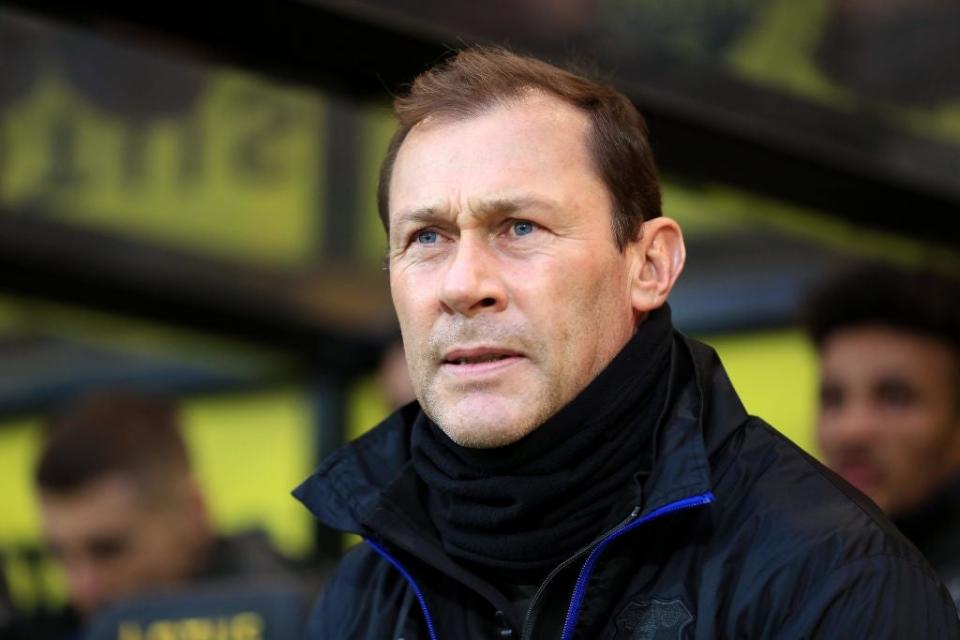Duncan Ferguson is adored by the fans but Everton need more than a unifying figure

You can tell a lot about a club by its heroes, the men that symbolise its identity. Duncan Ferguson ranks highly among Everton’s pantheon of greats. That perhaps points to one of the underlying problems at Goodison Park.
The 50-year-old takes charge of the first game of his second spell as caretaker manager when the Blues face Aston Villa on Saturday. Ferguson fills the void in the dugout left by the sacking of Rafa Benitez. He will rally the crowd and the visiting side and their manager Steven Gerrard – a Liverpool icon – can expect a hostile reception.
No Premier League club needs a unifying figure quite as much as Everton. The appointment of Benitez was a huge mistake. The Spaniard’s Anfield credentials made him unacceptable to the majority of the fanbase and goodwill was in short supply inside Goodison. Farhad Moshiri, the owner, Bill Kenwright, the chairman, and Alisher Usmanov, the most significant sponsor and Moshiri’s business partner and mentor, were pulling in different directions – an issue that long predated Benitez. If Ferguson can bring a semblance of common purpose, it will be a good thing for Everton.
The problem is that he has been here before. He was asked to mind the store for four games a little more than two years ago when Marco Silva was sacked. It was an impressive little spell. The team beat Chelsea and drew with Manchester United and Arsenal. They lost a League Cup tie against Leicester City on penalties and the mood was good when Carlo Ancelotti took the helm.
Ferguson has been on the staff of six managers. He will undoubtedly be retained by a seventh. Roberto Martinez, one of that sextet, is high on the list to replace Benitez – as is Wayne Rooney, whose performance in charge of Derby County has turned heads.
Ferguson has already galvanised the supporters. In an interview on the club website he made a call to arms and gave his advice to the team. “Imagine if you asked a fan to put a shirt on and get on the pitch, what would they do? Well they [the players] need to do that,” he said.
If only it was that simple. Ferguson is a strange idol for a club with such a glorious history. In his best season he scored 11 league goals. One of his signature performances came in a 2-0 victory over Liverpool on a Monday night in 1994. He was still on loan from Rangers and was probably going to be sent back to Glasgow after it emerged that his preparation for the derby consisted of a boozy weekend that was punctuated by a Saturday-night arrest for drunken driving. The 56th minute goal, his first for Everton, changed everything. The ultimate dog of war was on his way to becoming a legend at the School of Science.
His popularity was immense even in the unlamented late 1990s. A long-departed Goodison official complained about his sale to Newcastle United, remarking that Ferguson put 5,000 on the gate every time he was on the teamsheet. It was an exaggeration but there was some truth in the claim. Understanding why is complex. He averaged less than 5.5 goals per season during his 11 campaigns at Everton.
He was never a yard-dog – his touch was excellent – but his lack of discipline off the field was reflected in his injury record. Supporters love anti-heroes and cult figures but the reverence for Ferguson goes beyond that. He has been a talismanic figure for the most fallow period of Everton’s history.
That makes him a symptom of dysfunction. It has been noted that Ferguson is never on the list for other jobs away from Merseyside.
Gerrard, who is as close as you might get to an Anfield counterpart to Ferguson during roughly the same era, left to learn his trade at Rangers and now Villa. He is still idolised by the Kop because he dragged the team to trophies but if he ever returns to Liverpool he will do so with a resume that demands to be taken seriously. Ferguson played a bit part in the 1995 FA Cup final victory over Manchester United but has opted to remain at Finch Farm while the revolving door spits out managers.

Everton are not where they are because of Ferguson but he is a symbol of the modern ‘Everton Way.’ That way is not working and it has not functioned for some time.
Kenwright is much more culpable. His involvement in transfer business points to systemic flaws at Goodison.
Moshiri is a relative newcomer but the malaise has worsened and become more expensive under his watch. Perhaps the only way forward would be an iconoclastic rebuild. The possibility of Martinez 2.0 does not suggest anything like this is on the cards. A risky punt on Rooney would be bolder but might again contain more sentiment than is advisable.
Evertonians adore Ferguson because he loves the club, because of his hard-case reputation on and off the pitch and because he spent 11 seasons at Goodison. In only three of them did they finish in the top 10.
He is a strange kind of hero and no saviour. In a perverse way he is a symbol of some sort of vague Evertonian resistance – but resistance to whom or what? He is as embedded in this flawed institution as anyone. Ferguson is part of the problem, not part of the answer.

 Yahoo Sport
Yahoo Sport 





































